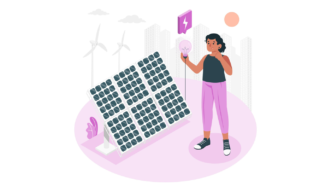LESSON OVERVIEW
This social welfare lesson plan deals with UBI, that is universal basic income. Have you heard of that concept before? In a nutshell, it’s an idea that the government gives all adult citizens a flat monthly payment – no strings attached. Got you curious? I bet it will get your students interested too 🙂 Students will get a lot of related vocabulary to learn as well as express their opinions on UBI and other social welfare issues. Moreover, they will watch a video that sparks the discussion and serves as a basis for a debate.
This is a Flipped Classroom lesson plan. In a nutshell, it means that the first part of the lesson needs to be done by students at home. Learn more about flipped classroom and how we implement it in these lesson plans in our post.
PRE-CLASS ACTIVITIES
First, students need to learn some vocabulary. In the first exercise they need to replace the underlined words and phrases in the sentences with the correct words and phrases from the list. The list includes the following vocabulary: on the dole, underprivileged, tax relief, subsidize, scheme, disparity, allocate, eligible. Next, they have another exercise on vocabulary, but this time they need match words to their meanings. The last part consists of a short text about UBI. The exercise is a typical CAE open cloze task in which students have to think of the word which fits each gaps.
IN-CLASS ACTIVITIES
The in‐class worksheet of this social welfare lesson plan starts with a discussion. Students have to express their opinion on different social welfare issues. The sentences for a discussion are taken from the first exercise in the worksheet that students we supposed to do before the class. Then, they watch a short podcast and find out what attitude towards UBI the speakers have. The second listening comprehension task is divided in two parts. Students need to watch parts of the video and find words that fit the meanings given. Finally, students read the opinions about UBI and discuss whether they agree or disagree with them. After that, they have to collect some arguments in favour of or against UBI and hold a debate with their classmates. If your students don’t have any ideas for arguments in favour of or against this topic, check what other people think on Kialo.
WORKSHEETS
Subscribe to unlock these and many other Standalone lesson lesson plans with the Unlimited plan
Subscribe













Hello,
I think this is a great lesson plan that address a controversial and current topic. I want to do it with my students but I’ve seen the video is not available in YouTube anymore, do you know if I can find it anywhere else?
Thank you in advance.
Keep up the good work!
Laura
It seems it disappeared from YouTube that’s why we linked in the same segment available on Facebook – you can watch it above or see the links in pdfs/e-lesson plan. Hope you’re going to enjoy talking about UBI with your students!
Thank you very much for your swift reply.
I can’t watch the video on this page and the link in the worksheet doesn’t work, and I haven’t found it on Facebook either. I did watch it here when you first put it up, but didn’t take any notes on the name of speakers or program, so I don’t know how I can find it. If you can tell me any of these details I may try to find it somewhere else.
Thanks a million!
Hmm, the link to the video is this: https://fb.watch/2fuekQHI4-/ and it’s a segment of Joe Rogen’s podcast withTulsi Gabbard on Universal Basic Income. It works fine on our end, both when we’re logged in on Facebook and not.
That link works, thanks a million!
That link works, thank you very much.
There is a mistake in :’wouldn´t want to do nothing…’, unless it is supposed to be bad grammar for the C1 student to identify?
Oh, yeah after looking at it again, we figured it was awkward and probably wrong. The whole sentence was ‘If it [UBI] was just the base of our income, people wouldn’t want to do nothing and stay poor.’ So the idea is that they wouldn’t want to stay at home and do nothing. We phrased that sentence to convey the same meaning but avoided this confusing double negation there. Thanks for bring this to our attention.
It may help some lower-level students if there was a transcript of the video provided – even if it was just on the teacher version. Sometimes the videos are interesting for my adult students but I know the speed of speech may be too fast or that accents too strong. As ESL students who work full-time, they do not have the time to replay the audio in order to understand or to hear certain vocabulary, especially if the video is over 5 minutes.
Usually, you can get the transcript of the video very easily. TED Talks have all of their videos with subtitles and professional transcripts available so it’s just copy+paste. Most YouTube videos have captions and transcripts as well – these are often auto-generated so you might need extra 5 mins to fix them. Unfortunately, this particular video doesn’t have any of that but we VERY rarely use videos not from YT or TED.
Love those lessons from Justa!
Thank you!
Hello,
This link to the video still works..
https://www.youtube.com/watch?v=burirOuVKJ8
One of my favorite lessons! Usually, it takes me 2 or even 3 hours to finish it due to the interesting discussion points.
I just noticed a small mistake: On slide 13, there is a verb missing after may/might/could. Probably ‘reduce’ or ‘cut’
Thanks for all your hard work!
Awesome to hear that! Thanks! In terms of the mistake, actually the verb is there, but it was covered by the answer (may/might/could), so you could only see it in the present mode. Anyway, I’ve just fixed it so that it’s visible in every mode now 🙂
This is a great lesson and I’ve use it many times, but I use this video https://youtu.be/kl39KHS07Xc I think it explains the concept of UBI in a more engaging way.
Thanks for all of your awesome content!
Thanks for sharing! I love the Kurtzgesagt videos and if it wasn’t for its length, we’d have used it here for sure.